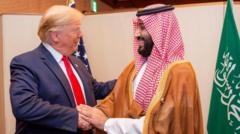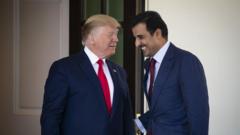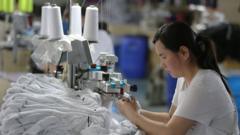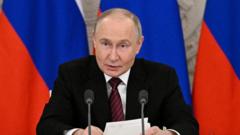The trade discussions in Switzerland mark a pivotal moment in ongoing economic tensions, with both sides engaging in a dialogue aimed at resolving tariff disputes.
Trump Declares "Total Reset" in US-China Trade Relations After Constructive Talks

Trump Declares "Total Reset" in US-China Trade Relations After Constructive Talks
President Trump shares optimistic views on recent negotiations, signaling potential for improved US-China trade ties.
In a recent social media update, President Donald Trump hailed the ongoing US-China trade negotiations as a "total reset," following the first constructive meetings held in Switzerland. The discussions, which commenced over the weekend, focused on the escalating trade war that has seen the imposition of substantial tariffs between the two nations.
Trump characterized the talks as "very good," highlighting the friendly yet constructive nature of the exchanges between US Treasury Secretary Scott Bessent and China's Vice-Premier He Lifeng. Previously, the US had enacted tariffs on Chinese imports up to 145%, prompting retaliatory tariffs of 125% from China on American goods.
As the two countries gathered in Geneva, Trump expressed hope for an opening of China to American businesses, stating, "GREAT PROGRESS MADE!!!" He emphasized that mutual benefit for both countries must be prioritized. Meanwhile, White House Press Secretary Karoline Leavitt clarified that the US would not reduce tariffs unilaterally, stressing the necessity for concessions from China.
Despite the largely cautious expectations surrounding the talks, reports emerged from China indicating that the government was prepared to engage with the US in light of global pressures and appeals from American businesses. The situation has left Chinese exporters, like Sorbo Technology, grappling with the impact of tariffs, with significant quantities of unsold products now stranded in storage.
In response to a heightened trade conflict, Trump previously imposed a universal baseline tariff on imports to the US, labeling it as a move against unfair trade policies and designating around 60 nations as "worst offenders." This action was accompanied by a 25% import tax on steel, aluminium, and automobiles.
Notably, a recent agreement between the US and UK reduced tariffs on British cars from 25% to 10% for a limited quantity, showcasing a shift in trade relations as nations navigate the complexities of the global economy. The ongoing dialogue between the US and China remains of critical importance, as both parties seek avenues for collaboration amidst challenges in international trade.
Trump characterized the talks as "very good," highlighting the friendly yet constructive nature of the exchanges between US Treasury Secretary Scott Bessent and China's Vice-Premier He Lifeng. Previously, the US had enacted tariffs on Chinese imports up to 145%, prompting retaliatory tariffs of 125% from China on American goods.
As the two countries gathered in Geneva, Trump expressed hope for an opening of China to American businesses, stating, "GREAT PROGRESS MADE!!!" He emphasized that mutual benefit for both countries must be prioritized. Meanwhile, White House Press Secretary Karoline Leavitt clarified that the US would not reduce tariffs unilaterally, stressing the necessity for concessions from China.
Despite the largely cautious expectations surrounding the talks, reports emerged from China indicating that the government was prepared to engage with the US in light of global pressures and appeals from American businesses. The situation has left Chinese exporters, like Sorbo Technology, grappling with the impact of tariffs, with significant quantities of unsold products now stranded in storage.
In response to a heightened trade conflict, Trump previously imposed a universal baseline tariff on imports to the US, labeling it as a move against unfair trade policies and designating around 60 nations as "worst offenders." This action was accompanied by a 25% import tax on steel, aluminium, and automobiles.
Notably, a recent agreement between the US and UK reduced tariffs on British cars from 25% to 10% for a limited quantity, showcasing a shift in trade relations as nations navigate the complexities of the global economy. The ongoing dialogue between the US and China remains of critical importance, as both parties seek avenues for collaboration amidst challenges in international trade.






















